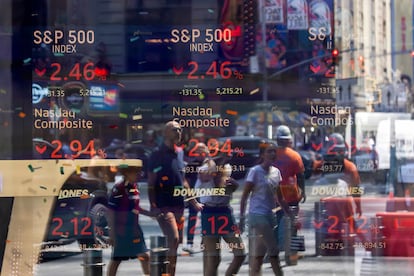Kolanovic, the ‘Nostradamus’ of Wall Street, fired after predicting stock market storm
The former head of global strategy for JPMorgan had been warning of a correction since September last year. He was fired a few days before the S&P 500 plunged


Marko Kolanovic’s last dance as Wall Street’s most bearish strategist cost him his job: he had been warning since September last year — even before the S&P’s astronomical 25.5% climb — warning of a sharp drop in the index by the end of 2024. What’s more, he also warned of an impending recession in the United States. The message from JPMorgan’s former head of global strategy foreshadowed the storm that hit global stock markets this week, after the S&P fell almost 400 points following the panic unleashed last Friday.
Over the course of his 19 years at the helm of the U.S. investment bank, Kolanovic came to embody a kind of Nostradamus in the stock market: Bloomberg called him “Gandalf,” and the U.S. television network CNBC described him as “the man who moves markets.” Kolanovic — who is also a physics professor — was one of the most bearish of the bearish strategist, even during the start of the post-pandemic rally, when blue-chip stocks rose by almost 40% up from 2023 values.
The chief strategist’s message fell on deaf ears. He was a pessimist in a market in full euphoria. Barely 48 hours after the collapse of global financial markets, and after the S&P 500 suffered an 8.5% plunge from its peak, the Nasdaq a 13% drop from its highs and the Nikkei a 25% drop, Kolanovic’s warnings are hanging over the market like an albatross.
Best inverse indicator was Marko Kolanovic getting fired from JPMorgan Chase as the last bear on Wall Street. Literally marked the top on the market. He will end up looking like a genius.
— Gareth Soloway (@GarethSoloway) August 6, 2024
Morgan Stanley strategist Mike Wilson had also been warning for months about the risk of a correction in the S&P 500 index. “I think the chance of a 10% correction is highly likely sometime between now and the election,” Wilson warned Bloomberg a month ago, although he changed his bearish forecasts in May. The last remaining bear in an unchecked bull market was Kolanovic.
JPMorgan finally fired Kolanovic on July 3, according to an internal memo obtained by Bloomberg and confirmed by The Wall Street Journal. And the S&P 500 continued its rally with no signs of tiring, reaching a never-before-seen all-time high of 5,667 points on July 16. But there is no denying the natural order of the market: all that rises eventually falls. On the first Monday of August, traders were met with screens full of flashing red numbers. Kolanovic’s prophecy (or at least, a part of it) came true, and his dismissal came when the market had reached its peak.
Kolanovic’s case is reminiscent of the retirement of Merrill Lynch’s legendary bearish Charles Clough, who left his financial career just days after the dot-com bubble burst in the summer of 1999. For four years, Clough had been betting against the S&P 500, which was riding a 220% rally in the midst of the internet boom.
It should be clarified that the departure of Clough — who was at the helm of JPMorgan for almost two decades — was not only related to this last aggressive bearish position, but the fact that he remained bullish in 2022, a time when the index plunged 19%, and other voices on Wall Street were warning of a downward trend.
Sign up for our weekly newsletter to get more English-language news coverage from EL PAÍS USA Edition
Tu suscripción se está usando en otro dispositivo
¿Quieres añadir otro usuario a tu suscripción?
Si continúas leyendo en este dispositivo, no se podrá leer en el otro.
FlechaTu suscripción se está usando en otro dispositivo y solo puedes acceder a EL PAÍS desde un dispositivo a la vez.
Si quieres compartir tu cuenta, cambia tu suscripción a la modalidad Premium, así podrás añadir otro usuario. Cada uno accederá con su propia cuenta de email, lo que os permitirá personalizar vuestra experiencia en EL PAÍS.
¿Tienes una suscripción de empresa? Accede aquí para contratar más cuentas.
En el caso de no saber quién está usando tu cuenta, te recomendamos cambiar tu contraseña aquí.
Si decides continuar compartiendo tu cuenta, este mensaje se mostrará en tu dispositivo y en el de la otra persona que está usando tu cuenta de forma indefinida, afectando a tu experiencia de lectura. Puedes consultar aquí los términos y condiciones de la suscripción digital.








































